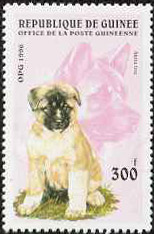
Rational selection of gastrointestinal drugs for cats and dogs
Choosing the right drugs for cats and dogs with gastrointestinal problems
source Edward Hall
In Practice vol 24 no 5, May 2002
starts p 242, 6 pages long
An accurate diagnosis of gastrointestinal disease in cats and dogs is needed in order to choose the most appropriate drugs. Sometimes tackling the symptoms of a disease can cause more problems than it solves, by delaying treatment of the cause of the problem. Diets should be good quality and highly digestible. Antibiotics should be used only when clearly needed, due to the risks of antibiotic resistance, though risks of inducing abnormal flora through usage of antibiotics have probably been exaggerated. Antibiotics can be used where there are specific, culture-proven infections with systemic signs, in the case of haemorrhagic diahorrea, and in the case of bacterial overgrowth in the small intestine.
Other drugs used to treat gastrointestinal disease include mucosal (cyto)protectants. Sucralfate is one such drug, and, though not licensed to be used in cats and dogs, the only side effect reported is constipation. There is concern that it could interact with other drugs, such as acid blockers and tetracycline, so it is safer to time doses of the different drugs with an hour at least between them.
Acid blockers are used to help healing of gastric and oesophageal ulcers. They include antacids, H2-antagonists, and proton pump inhibitors. Antiemetics can be helpful, though they may have side-effects, such as drowsiness. Prokinetics and antidiarrhoeals are other drug types that may be indicated.
Another class of drugs used to tackle gastrointestinal problems are immunosuppressive drugs, which should be used with caution. They should only be used where a biopsy has confirmed that there is significant inflammation, and where known reasons for the inflammation have been excluded. The article examines the selection of gastrointestinal drugs in further detail.
DO,HD


